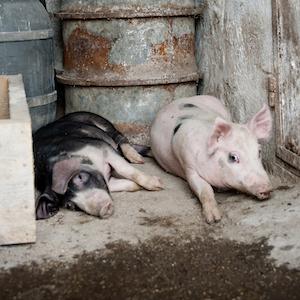Another creepy hemorrhagic fever is in the news. This time, the victims are pigs, rather than humans.
Called African Swine Fever (ASF), the viral illness has swept across China. CNN reports that the Chinese government blames unhygienic and illegal transportation of pigs. So far, more than 200,000 pigs have been culled in an attempt to stop the epidemic.
The good news is that ASF has nothing to do with swine flu and does not infect humans; the bad news is mostly for pig farmers and ranchers who are facing, as Russian scientists claim, "arguably the most dangerous swine disease worldwide." Given that China houses about half of the world's commercial pigs, the economic disruption -- such as putting small farmers in Asia out of business and causing a spike in pork prices -- could be severe.
What Do We Know about African Swine Fever (ASF)?
Viral hemorrhagic fevers in humans (e.g., Ebola) tend to be single-stranded RNA viruses, but ASF is caused by a double-stranded DNA virus.
It can also be incredibly lethal. The UN's Food and Agriculture Organization says that the nastiest version of the virus has a mortality rate of 100%. There is neither a vaccine nor a cure. Because pork is so common in Asia, the UN fears that the virus will spread like wildfire across the continent.
The current epidemic began in Russia. In April 2018, Russian scientists reported that, from 2007 to 2017, about 800,000 pigs across their country died due to roughly 1,000 outbreaks of the virus. By 2017, the disease had spread to the Czech Republic, Moldova, Romania, and Siberia. It was just a matter of time before the virus went crawling into China.
Part of the trouble with containing the disease is that it is spread by wild pig populations. These pigs tend not to get sick, which means they can travel far and wide, transmitting the disease to other pigs. When the virus reaches domesticated pigs, however, it wreaks havoc, causing bleeding and ultimately death. Farmers and others involved in the pork supply chain can help by not transporting infected meat.
This Little Piggy Went to the Doctor
Unfortunately, there is no reason to believe that the ongoing ASF epidemic is under control. We can fully expect the disease to spread, not just throughout Asia but Europe as well. Keep an eye on the headlines.




